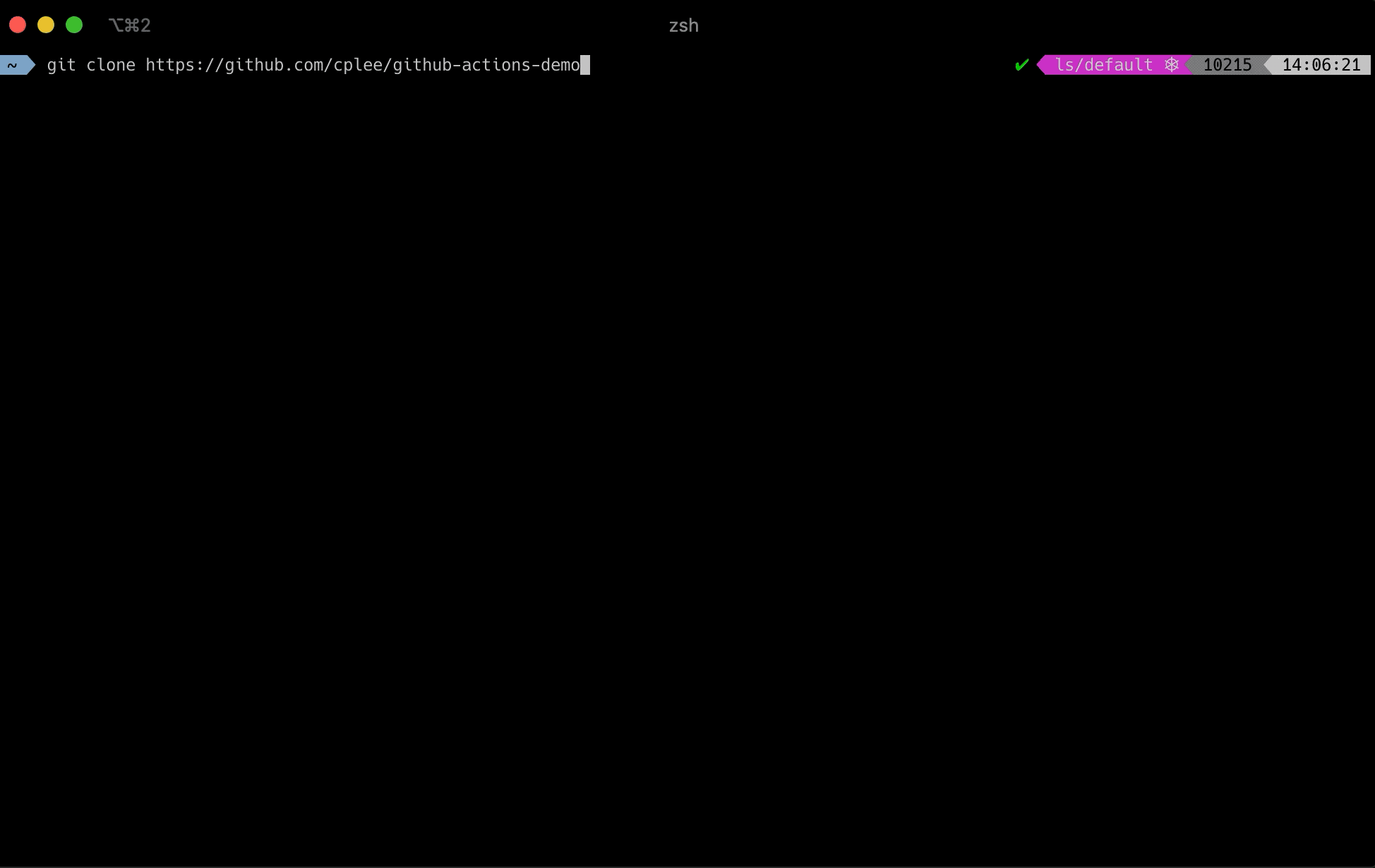https://github.com/nektos/act
Run your GitHub Actions locally 🚀
https://github.com/nektos/act
ci devops github-actions golang
Last synced: 10 months ago
JSON representation
Run your GitHub Actions locally 🚀
- Host: GitHub
- URL: https://github.com/nektos/act
- Owner: nektos
- License: mit
- Created: 2019-01-02T19:53:43.000Z (about 7 years ago)
- Default Branch: master
- Last Pushed: 2025-05-04T12:13:25.000Z (10 months ago)
- Last Synced: 2025-05-05T15:11:27.393Z (10 months ago)
- Topics: ci, devops, github-actions, golang
- Language: Go
- Homepage: https://nektosact.com
- Size: 9.68 MB
- Stars: 60,992
- Watchers: 179
- Forks: 1,575
- Open Issues: 221
-
Metadata Files:
- Readme: README.md
- Contributing: CONTRIBUTING.md
- Funding: .github/FUNDING.yml
- License: LICENSE
Awesome Lists containing this project
- awesome-go - nektos/act
- go-awesome - act - 本地运行 [GitHub Actions](https://developer.github.com/actions/) (开源类库 / devops)
- awesome-starred - nektos/act - Run your GitHub Actions locally 🚀 (Go)
- awesome-tools - act - 在本地执行 GitHub Actions,我之前用来开发 GitHub Actions。 (Github / Snippets Manager)
- Self-Hosting-Guide - Act
- go-awesome - act - run locally [GitHub Actions](https://developer.github.com/actions/) (Open source library / Developer)
- Fuchsia-Guide - Act
- awesome-workflows - Run GitHub Actions Locally in Terminal
- awesome-technative - Act - Run your GitHub Actions locally.[](https://badgen.net/github/stars/nektos/act) (Pipelines / Log Management)
- awesome-github-actions - act
- AWS-Guide - Act
- StarryDivineSky - nektos/act - 无需在每次要测试对 `.github/workflows/` 文件所做的更改(或对嵌入式 GitHub 操作的任何更改)时都提交/推送,而是可以在 `act` 本地运行操作。环境变量和文件系统都配置为与 GitHub 提供的内容相匹配。 (网络服务 / 网络服务_其他)
- definitive-opensource - act
- awesome-modern-devops - Act - Run your GitHub Actions locally. (CI/CD)
- awesome - nektos/act - Run your GitHub Actions locally 🚀 (Go)
- awesome-github-actions - Act
- stars - nektos/act - Run your GitHub Actions locally 🚀 \[*MIT License*\] (⭐️68890) (Go)
- awesome-resources - nektos/act - Run Github Workflows locally (PHP / PHP Dev Tools)
- awesome-ops - nektos/act - 01-02|2025-11-01 | 本地运行 GitHub Actions | (CICD)
- stars - act
- awesome - nektos/act - Run your GitHub Actions locally 🚀 (Go)
- Virtualization-Emulation-Guide - Act
- awesome-list - Act - Run your GitHub Actions locally (Github tools)
- VMware-Guide - Act
- Oracle-Cloud-Guide - Act
- Blockchain-Guide - Act
- Apache-Kafka-Guide - Act
- Developer-Handbook - Act
- VSCode-Guide - Act
- awesome-list - act
- my-awesome-list - act
- awesome - nektos/act - Run your GitHub Actions locally 🚀 (Go)
- awesome - nektos/act - Run your GitHub Actions locally 🚀 (Go)
- my-awesome - nektos/act - actions,golang pushed_at:2026-02 star:68.7k fork:1.8k Run your GitHub Actions locally 🚀 (Go)
- awesome-actions - nektos/act
- awesome-backend - Act
- awesome-repositories - nektos/act - Run your GitHub Actions locally 🚀 (Go)
- awesome-starred-test - nektos/act - Run your GitHub Actions locally 🚀 (Go)
- my-awesome-starred - nektos/act - Run your GitHub Actions locally 🚀 (Go)
- awesome-actions - Run GitHub Actions Locally in Terminal
- fucking-awesome-actions - Run GitHub Actions Locally in Terminal
- awesome-devtools - Act - Run github actions locally (Command line - Linux / Learning resources)
- awesome-runners - nektos/act - P option](https://github.com/nektos/act#use-an-alternative-runner-image), see a more complex example [here](https://github.com/jonico/visualize-actions-matrix-builds-on-k8s/blob/master/simulate-action-workflow.sh). (Purpose / A word about self-hosted action runner images / virtual environments and how to test locally)
- awesome-ccamel - nektos/act - Run your GitHub Actions locally 🚀 (Go)
- awesome - nektos/act - Run your GitHub Actions locally 🚀 (Go)
- awesome - nektos/act - Run your GitHub Actions locally 🚀 (<a name="Go"></a>Go)
- jimsghstars - nektos/act - Run your GitHub Actions locally 🚀 (Go)
README

# Overview [](https://github.com/nektos/act/actions) [](https://gitter.im/nektos/act?utm_source=badge&utm_medium=badge&utm_campaign=pr-badge&utm_content=badge) [](https://goreportcard.com/report/github.com/nektos/act) [](https://github.com/jonico/awesome-runners)
> "Think globally, `act` locally"
Run your [GitHub Actions](https://developer.github.com/actions/) locally! Why would you want to do this? Two reasons:
- **Fast Feedback** - Rather than having to commit/push every time you want to test out the changes you are making to your `.github/workflows/` files (or for any changes to embedded GitHub actions), you can use `act` to run the actions locally. The [environment variables](https://help.github.com/en/actions/configuring-and-managing-workflows/using-environment-variables#default-environment-variables) and [filesystem](https://help.github.com/en/actions/reference/virtual-environments-for-github-hosted-runners#filesystems-on-github-hosted-runners) are all configured to match what GitHub provides.
- **Local Task Runner** - I love [make](). However, I also hate repeating myself. With `act`, you can use the GitHub Actions defined in your `.github/workflows/` to replace your `Makefile`!
> [!TIP]
> **Now Manage and Run Act Directly From VS Code!**
> Check out the [GitHub Local Actions](https://sanjulaganepola.github.io/github-local-actions-docs/) Visual Studio Code extension which allows you to leverage the power of `act` to run and test workflows locally without leaving your editor.
# How Does It Work?
When you run `act` it reads in your GitHub Actions from `.github/workflows/` and determines the set of actions that need to be run. It uses the Docker API to either pull or build the necessary images, as defined in your workflow files and finally determines the execution path based on the dependencies that were defined. Once it has the execution path, it then uses the Docker API to run containers for each action based on the images prepared earlier. The [environment variables](https://help.github.com/en/actions/configuring-and-managing-workflows/using-environment-variables#default-environment-variables) and [filesystem](https://docs.github.com/en/actions/using-github-hosted-runners/about-github-hosted-runners#file-systems) are all configured to match what GitHub provides.
Let's see it in action with a [sample repo](https://github.com/cplee/github-actions-demo)!

# Act User Guide
Please look at the [act user guide](https://nektosact.com) for more documentation.
# Support
Need help? Ask on [Gitter](https://gitter.im/nektos/act)!
# Contributing
Want to contribute to act? Awesome! Check out the [contributing guidelines](CONTRIBUTING.md) to get involved.
## Manually building from source
- Install Go tools 1.20+ - ()
- Clone this repo `git clone git@github.com:nektos/act.git`
- Run unit tests with `make test`
- Build and install: `make install`